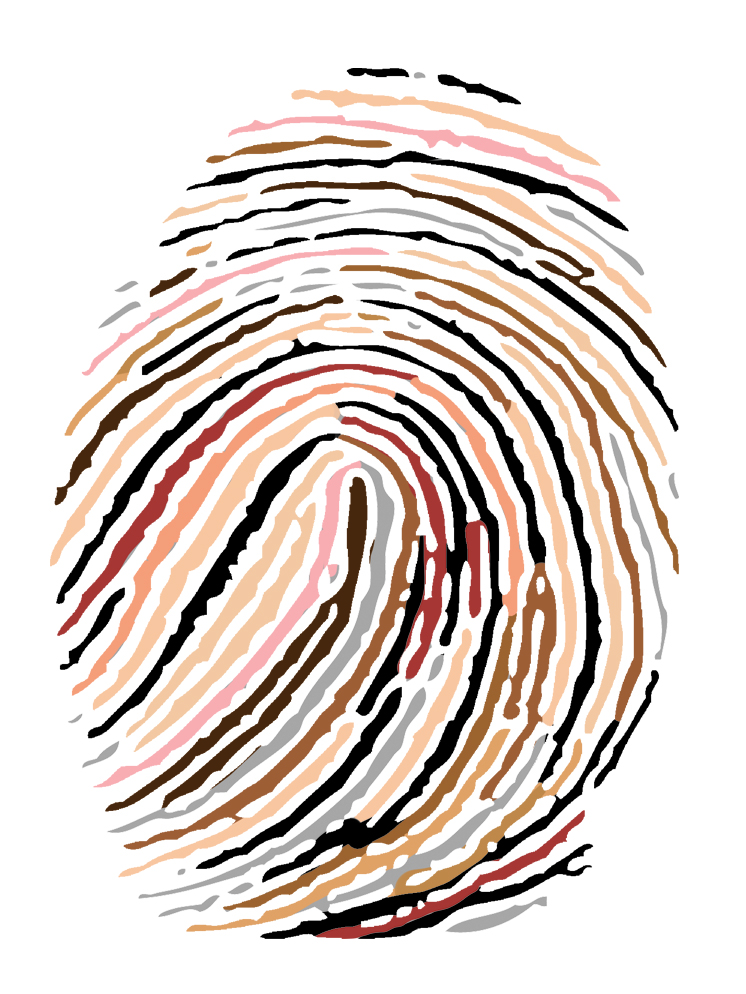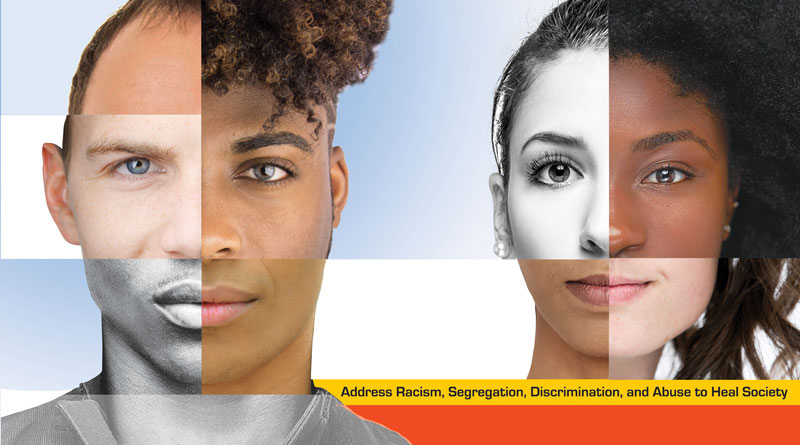Look Beyond Skin Color.
Address Racism, Segregation, Discrimination, and Abuse to Heal Society
By: María Alejandra Pulgar
“What color is God’s skin?
I said it’s black, brown, it’s yellow
It is red, it is white.
Ev’ry man’s the same in the good Lord’s sight.”
Tom Wilkes & David Stevenson
Racism is the ugly child of Ignorance and Fear, and its consequences are Segregation, Discrimination, Hatred, and Abuse. Those concepts are difficult to address in any social setting, especially in private.
However, it is exactly in private where they need to be discussed first and at length, in order to educate the new generation and speed up the healing process of the intergenerational wounds inflicted on the Black American population since the moment Africans were brought against their will to a port in Virginia, starting one of the most somber chapters on American history that, 400+ years later, still has consequences in society.
The issue is not that one group of lives matter above others; the point is that if effective solutions to racial profiling, social segregation, and unequal justice administration are not reached soon, almost 15% of American society will continue suffering, and that is wrong. Solutions are long overdue and will be reached only through improvements on fair administration of justice, education, and the civic participation of all Americans in solidarity with each other, looking beyond the color of their skin.
Acknowledge racist behaviors to spark change
Only 3% of the population in Doral and 16% in Miami-Dade County identifies as Black. Miami is a bubble where 71% of people are of Hispanic origin, most of whom do not consider they are racists or that racism was prevalent in their countries of origin.
 A 2019 report from the Pew Research Center for Social and Demographic Trends on the status of Race in America, shows that 67% of Hispanics in all the US think that the bigger problem society confronts is people not seeing racial discrimination where it really exists.
A 2019 report from the Pew Research Center for Social and Demographic Trends on the status of Race in America, shows that 67% of Hispanics in all the US think that the bigger problem society confronts is people not seeing racial discrimination where it really exists.
Many Hispanics that arrived in Miami back in the ’50s and ’60s remember the segregation of spaces and the signs that read “No Dogs, No Blacks, No Cubans”. Those were complicated times for Miami’s society; however, there are still Hispanics who bring racial preconceptions from their countries that have to be unlearned in order to be effective in helping heal American society and embracing racial diversity.
Some behaviors, expressions, remarks, and vocabulary Hispanics use on their daily lives contradict the anti-racism they claim to support. Slavery in South America and the Caribbean was extensive and complicated; in colonial Brazil alone, there were 5 million Black people owned as slaves. Racist behaviors, segregation, and discrimination are present in Central and South American countries, and it is a very difficult issue to admit and address. It can be denied, but it still exists.
58% of Hispanics in America report being victims of racial profiling and facing obstacles for socioeconomic advancement due to their ethnic origin. Getting educated on how to end racism, supporting solutions to the struggles of Black communities, of Hispanic origin or otherwise, and standing in solidarity is a duty for Hispanics as a minority population in the U.S.
Webster’s dictionary defines racism as “a belief that race is the primary determinant of human traits and capacities and that racial differences produce an inherent superiority of a particular race”. The definition includes racial prejudice or discrimination, systems founded on ideas of racial superiority, and doctrines or political programs where racial differences determine policy and its execution.
Acknowledging a personal lack of education to recognize racism and the issues that Black Americans still confront is the first step towards finding real solutions to this fundamental social problem. It is important to acknowledge that this will take time; all members of society should step up to the challenge and be mindful. Recent events have demonstrated the urgency of handling the matter.
However, solutions to racism have to be created without falling for extreme political positions, which have the underlying objective of destroying institutions instead of improving the system and are making grassroots efforts to take advantage of recent events to gain power in the elections next November. Access to reliable information and facts will avoid that risk and provide tools to make positive changes for all society.
A Summary of Black History in America
Black History Month is observed every February in the US since 1970. It is a celebration of the accomplishments of Black Americans after the Civil War and in modern days. Very few details are discussed about the origins of slavery, the suffering its victims had to endure, and the impact it still has in the social and economic advancement of Black people in America.
August 20th, 1619 is the documented date of arrival of the first group of Black people kidnapped in Africa and sold as slaves in American soil. The 400th anniversary of the event was commemorated in 2019 in several states, although some historians set the date some 80 years earlier when Spanish conquerors had Black slaves in what is now Florida.
Regardless of when it happened, the important point is that Black people were brought from Africa against their will to the American colonies; they were traded like cattle, separated from their families, forbidden of free transit, brutally punished, and forced to work without compensation. For 245 years, they were considered as lacking of intelligence or capacity to lead independent, productive lives freely, until the 13th Amendment passed abolishing slavery. No human being should have ever been treated that way.
A report by the American Civil Liberties Union (ACLU) documents that there were 4 million Black slaves in America in 1860 when the Civil War began, and they were worth “the equivalent of $3 billion of the day’s currency” to their owners. Owning slaves was important for the economy of the Southern states and their emancipation impacted it severely.
“Black Codes” were state and local laws created in the South after emancipation to detail when and how former slaves could work and be compensated. They were the roots for “Jim Crow Laws”, stronger legislations which marginalized Black people, forbidding them from living in white neighborhoods, enforcing segregation in public places and schools, and many other controls. Those laws were supported by a justice system that made it difficult for African Americans to win court cases and applied longer sentences to Black offenders.
It took Black Americans 100 more years after emancipation to fully incorporate to society when, in the 1960’s, the Civil Rights Movement finally won the reforms that provided a legal framework for the advancement of Black people in America. However, many problems persist in administration of justice that continues impacting Black Americans.
Yes. Systemic Racism is real
Institutional Racism was first defined by Stockey and Hamilton in 1967 as “instances of racial discrimination, inequality, exploitation and domination in organizational or institutional contexts.” An example of it is Systemic Racism.
Systemic Racism was defined by Derrick Johnson, President of NAACP (National Association for the Advancement of Colored People) as “systems and structures that have procedures or processes that disadvantages African Americans.”
Many of those systems that have maintained inequalities for African Americans have their roots in the Jim Crow Laws explained above, which prevented Black people in many states from moving to better neighborhoods, attending better schools, or getting better jobs, further delaying the social advancement of that social group. Systemic Racism also refers to other pieces of legislation over the years that have impacted the administration of justice for the Black population, like the 1994 Crime Bill which led to the mass incarceration of Black Americans.
There are still those who consider others to be of lesser value to society just for the color of their skin. The FBI Hate crimes report from 2018 shows there were 3,285 hate biased crimes against non-white people, 48% of them against Black people. That is an embarrassing statistic for a country where freedom and justice for all is a value.
The Pew Research Report on Race in America for 2019 found that 45% of White Americans consider that being white has helped them get ahead in society, while 52% of Black Americans consider being black has impacted their possibilities to improve their lives through getting a better education or better jobs.
Institutions and society need to identify and correct the loopholes that maintain systemic racism. Improvements in legislation and procedures have to happen soon to fulfill that need of the Black community.
 Change comes through education and participation, not violence
Change comes through education and participation, not violence
The Founding Fathers of this country, despite being slave owners themselves, envisioned a Nation where all men were treated equal, where the rights of Life, Liberty, and the Pursuit of Happiness were protected by the laws described in the Constitution.
The Government system was designed to foster checks and balances and the constant growth and evolution of the United States. Not in vain, the back of the Dollar bill has an unfinished pyramid, representing the never-ending construction of the country.
Respect and enforcement of laws are at the base of that pyramid. Improvement of the judicial system and of the law enforcement departments can only be achieved through education on social issues and modification of structures when necessary to ensure equal treatment to all Americans.
Dismantling or defunding law enforcement bodies or resorting to violence, looting, and destruction may look for some like a fast track to achieve change, but none of those methods would ever bring real, permanent solutions and only would undermine the efforts to gain awareness to the important issues of Black communities. Permanent positive changes in history are the result of persistent civic involvement and participation. Violence creates more violence, pain, and destruction, and it is never the answer.
Black History in America cannot be changed, but future history can be brighter through consistent education of all society on Black issues and persistent, informed civic participation to solve them. Education to create awareness and participation, to create change, are the right methods to achieve a better society.
Where do I start to educate myself and my family about racism?
The following is a list of resources to read and learn about Black History and Racism in America
https://www.britannica.com/event/American-civil-rights-movement
https://www.history.com/topics/early-20th-century-us/jim-crow-laws
https://www.pewsocialtrends.org/2019/04/09/race-in-america-2019/
https://www.law.cornell.edu/wex/civil_rights
https://www.pewsocialtrends.org/2019/04/09/how-americans-see-the-state-of-race-relations/
https://projects.iq.harvard.edu/files/deib-explorer/files/sociology_of_racism.pdf
https://www.childline.org.uk/info-advice/bullying-abuse-safety/crime-law/racism-racial-bullying/
http://homelesstrust.org/library/miami-dade-coc-2018-racial-disparities-assessment.pdf


At a time where there is so much division and conflict, it’s refreshing to read about possible solutions.
” that racism was prevalent in their countries of origin.”
Lol yea ok if they say so because it did not affect them . I would not want to be Black in Latin America and PC left I am not but not blind either .
This July .19 at 10 pm on CNN ‘ United Shades of America ‘ has Miami which is long over due .